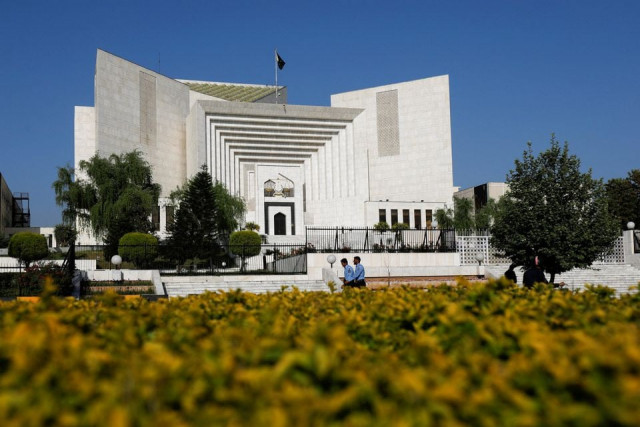SC stresses doctrine of trust for public office
CJP observes courts not the forum for political disputes

Chief Justice of Pakistan Umar Ata Bandial observed on Wednesday that the courts were not the forum for political disputes, emphasising that judges were the guarantors of public trust as ‘doctrine of trust’ was essential for the public office.
During a hearing of Pakistan Tehreek-e-Inasf (PTI) Chairman Imran Khan’s petition against the recent amendments to the National Accountability Ordinance (NAO), the chief justice stressed that striking down a law was not necessary because the court had other options, too.
During the hearing, government’s lawyer Makhdoom Ali Khan continued his arguments. He told the court that it was for the first time that an assembly member was challenging an act of parliament. He added that he would also advance arguments on the mala fide intentions of the petitioner.
A three-member special bench headed by Chief Justice Bandial heard Imran’s petition. Makhdoom Ali Khan, the federal government lawyer, said that the majority of the members of the National Assembly approved the amendments of the National Accountability Bureau (NAB) law.
Read SC takes notice of delay in AGP appointment
It was strange, Khan said, that an act of parliament was being challenged by a member of parliament himself. It was also strange that former prime minister Imran Khan, who had challenged the amendments, had expressed reservations about the NAB law many times.
Besides, on several occasions, former information minister, former law minister and former finance minister had also expressed reservations about the NAB law. Khan offered to present in the court the copies of the statements of the PTI leaders.
Khan argued that it was the petitioner’s responsibility to prove whether or not the act of parliament was unconstitutional. Furthermore, the government lawyer told the court, judiciary must find every justification under which the law could be upheld, adding that any lacuna could be removed through parliament.
Sitting on the bench, Justice Mansoor Ali Shah asked about any precedent that a member of parliament had challenged legislation. On that Makhdoom Ali Khan replied that there was no case in his knowledge in which a member of parliament had challenged a law.
Khan said that 159 National Assembly members were present in the session at the time of the approval of the NAB law amendments. However, the chief justice questioned whether it was necessary that the opposition was also present at the time of legislation.
Read more Court 'unimpressed' by borrowing for projects in billions
In the current case, Chief Justice Bandial said, he saw improvements in the law. It was not necessary to declare the law null and void, the chief justice told the government lawyer. He said that the court had options other than nullifying the law, adding that a law should proceed only if it was in accordance with the Constitution.
Justice Shah pointed out that the court would consider the options only if the NAB amendments were in conflict with the fundamental rights. Makhdoom Ali Khan replied that a law could not sustain if it was in conflict with fundamental rights.
The chief justice remarked that the courts were not the place to take political decisions. Would disputes arise if the court started taking decisions on controversial issues, he asked, adding that there was a political controversy surrounding this case.
Referring to the arguments of the PTI’s lawyer that corruption existed in the form of a disease since the creation of Pakistan, the chief justice remarked that there should be a balance between public interest and individual benefits.
The question was how to defend and protect the Constitution and how far the court could go in its decisions, he said. “The Constitution means the people of Pakistan. If the standards of accountability have fallen due to the recent NAB amendments, how can the court maintain them?”
Also read 'Apex court cannot strike down laws'
Chief Justice Bandial pointed out that ever since the creation of Pakistan, anti-corruption laws had been in place and the public officeholders were accountable because of those anti-corruption laws. The chief justice underscored that public trust was at the centre of all matters.
Makhdoom Ali Khan said that public trust was very important and pleaded that the judiciary should also trust parliament and politicians. The chief justice remarked that the court had faith in parliament, but the people had faith in the judiciary. Later, the hearing of the case was adjourned till January 12 (today).



















COMMENTS
Comments are moderated and generally will be posted if they are on-topic and not abusive.
For more information, please see our Comments FAQ